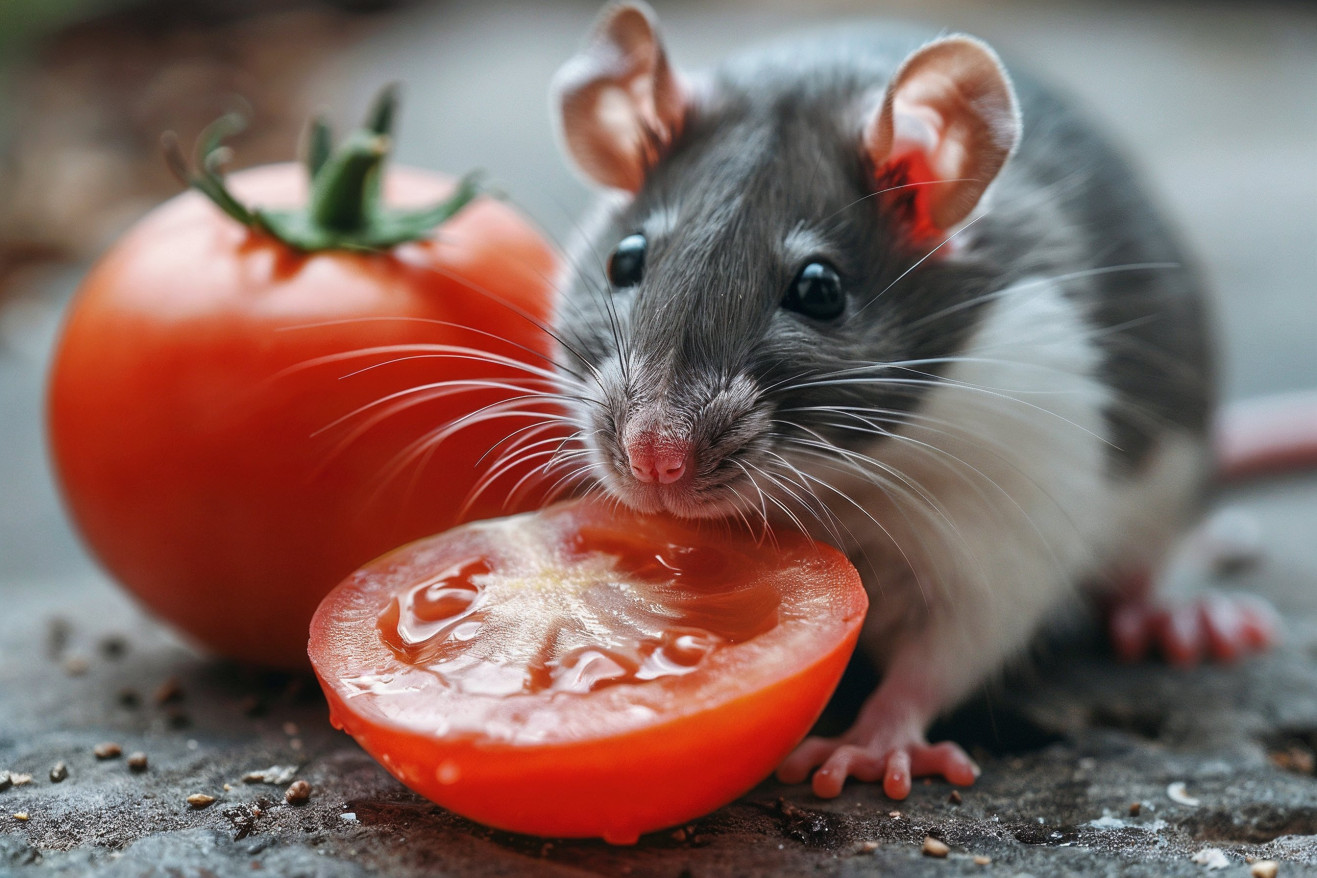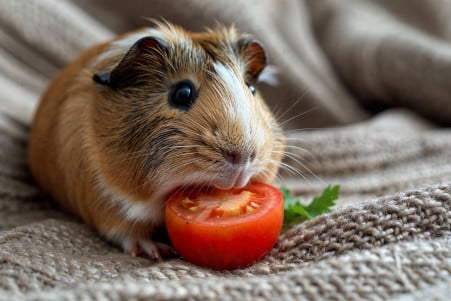Can Rats Eat Tomatoes? Nutritional Benefits and Feeding Tips
14 March 2024 • Updated 14 March 2024

Rats can eat tomatoes, and they can even get some important nutrients from them, like vitamin C and potassium. That said, you should only give your rat fresh tomatoes and make sure to take out the seeds, which can be a choking hazard.
You should also start by giving your rat small amounts of tomatoes to make sure they don’t have any tummy troubles or allergic reactions.
This article will use a wide range of biological and nutritional studies to look at the dietary patterns of rats and the impacts of eating tomatoes. We’ll look at research in veterinary nutrition, toxicology, and animal behavior to learn about the benefits and potential downsides of giving rats tomatoes.
Our hope is to give you a comprehensive, research-backed look at the topic so that you can decide whether or not to include tomatoes in your pet rat’s diet.
Can rats eat tomatoes?
Nutritional Benefits of Tomatoes for Your Rat’s Diet
Tomatoes can provide rats with a number of health benefits because they are packed with vitamins and minerals. They are especially high in vitamin C and potassium, as well as other antioxidants that can help improve overall health. The National Research Council notes that while tomatoes are not specifically mentioned, a complete diet for rats should contain the types of nutrients that tomatoes offer.
By including tomatoes in a rat’s diet, you can help ensure that they get the nutrients they need, which is consistent with the idea of a complete diet that many experts recommend. For example, the American Fancy Rat and Mouse Association says that lab blocks should be supplemented with fresh vegetables and fruits, including tomatoes, to make sure that a rat’s nutritional needs are met.
Tomatoes can help rats maintain healthy digestion because of their fiber content and they also have antioxidants that can help protect cells from damage.
However, it’s important to make sure that you don’t give your rat too much. Many experts recommend that fresh foods be given in small, controlled amounts so that they can be used to supplement a rat’s staple diet.
This way, the rat can get the benefits of tomatoes without throwing off their nutritional needs. This is important because it is consistent with the maintenance energy requirements and the specific life stage dietary needs that are outlined in the research on rat nutrient requirements.
Understanding the Risks: Tomato Seeds and Solanine Toxicity
While tomatoes can be a nutritious part of a rat’s diet, it’s also important to understand the risks associated with some parts of the tomato plant. For example, rats can choke on tomato seeds, and they can also experience gastrointestinal distress if they eat too many seeds.
However, the seeds aren’t the only part of the tomato plant that poses a risk. The leaves and stems of the tomato plant contain a toxic compound called solanine that can be harmful to pets, including rats.
According to the ASPCA, solanine can cause gastrointestinal upset, depression, weakness, and bradycardia (a slow heart rate) in animals. While the ripe fruit of the tomato plant is not toxic, it’s important to make sure that rats don’t have access to the plant’s toxic parts.
To ensure that your pet rat stays safe, only feed them the ripe flesh of the tomato and make sure to avoid the leaves, stems, and green unripe tomatoes, which contain higher levels of solanine. Studies have shown that solanine is toxic to animals, so it’s important to be cautious.
However, as long as you’re careful and feed your pet rat tomatoes in moderation, you can make sure that they enjoy the benefits of this fruit without any of the risks.
Acidity in a Rat’s Diet: Can Rats Eat Tomatoes?
Tomatoes are acidic, which can be worrisome for pet parents. But how does this affect a rat’s ability to eat them? One study published on PubMed looked at the effects of dietary acid load in rats and found that rats can adapt to different levels of dietary acid load without any significant changes in health. This means that the acidity in tomatoes isn’t likely to cause any problems for rats when eaten in moderation.
Rats’ digestive systems are good at handling acidic foods. The fermentation of food in the large intestine results in the production of short-chain fatty acids, which shows that rats are good at dealing with acidic compounds.
That said, it’s important not to discount the potential health effects of a high-acid diet in rats. A high-acid diet could potentially change urine pH, which could change calcium levels or alkaline phosphatase activity in the blood, according to PubMed.
To make sure that acidic foods like tomatoes can be part of a rat’s diet, it’s recommended that they be given in small, controlled amounts. This is consistent with the advice for feeding rats in general and will help to make sure that any potential acidic effects are minimized.
By feeding tomatoes in the context of a varied, well-balanced diet, they can help contribute to your pet rat’s overall health without putting them at risk.
Smart Feeding: How to Add Tomatoes to Your Rat’s Diet
To make sure that you’re keeping your rat healthy and happy, you should add tomatoes to their diet in a smart way. The RSPCA suggests that any fresh food, including tomatoes, should be supplementary to your rat’s main diet of formulated rat pellets and fed in small amounts.
When you first start feeding your rat tomatoes, give them a small portion and watch for any changes in their health. You want to make sure that the tomatoes aren’t taking the place of any essential nutrients that your rat needs from their main diet.
To make feeding time more interesting, the PDSA recommends that you hide pieces of tomato around your rat’s cage to encourage foraging, which is a natural behavior for rats. This will make feeding time more fun for your rat and give them some mental and physical stimulation.
It’s also important to make sure that you’re adding variety to your rat’s diet. According to the RSPCA, adding tomatoes to a variety of fresh foods can help improve your rat’s diet and overall well-being.
To make sure that you’re doing this in a way that’s safe and healthy for your rat, the RSPCA and PDSA suggest that you feed your rat tomatoes as an occasional treat. This will help ensure that your rat’s diet is balanced and interesting and meets their omnivorous needs.
By following these guidelines, you can make sure that you’re keeping feeding time fun, nutritious, and safe for your rat, and that you have a happy rat who’s always looking forward to their next tomato treat.
Final Thoughts: Tomatoes in a Rat’s Diet
Tomatoes can provide rats with a number of important nutrients, including vitamin C and potassium, that can be beneficial to their health when fed in moderation. Moderation is key to ensuring that tomatoes don’t throw off the balance of a rat’s diet and lead to any nutritional imbalances.
It’s also important to be aware of the potential dangers, including the choking hazard of tomato seeds and the solanine toxicity that can be found in the leaves and stems of the plant. This is why it’s important to only feed rats the parts of the tomato that are safe for them to eat.
It’s also important to introduce tomatoes to a rat’s diet slowly so that you can monitor them for any negative side effects. This will help you make sure that you don’t put your pet at risk while helping them enjoy a new food.
In conclusion, it’s clear that tomatoes can be a healthy addition to a rat’s diet if they are introduced with care and attention to safety. When fed in moderation, this juicy fruit can be a fun addition to a rat’s diet that can help keep things interesting and nutritious.


